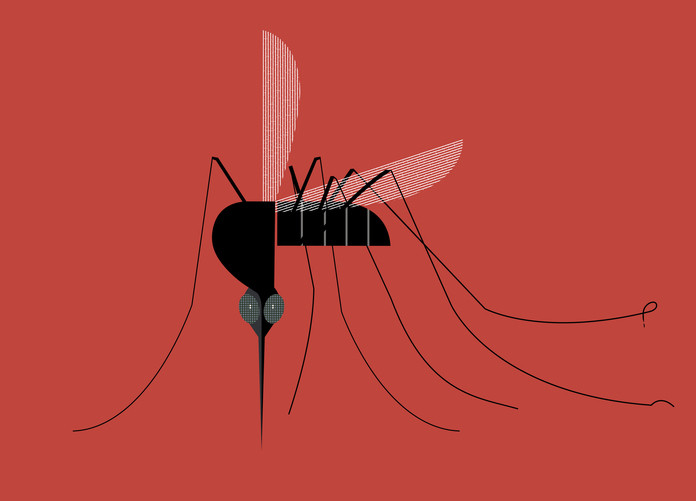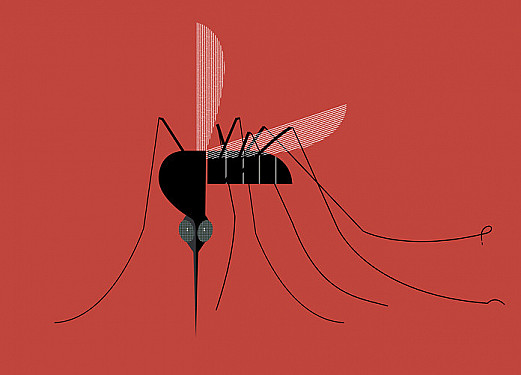
Mosquitoes are not just a buzzing summertime nuisance; they can carry serious diseases like West Nile virus, malaria, and Zika. In recent months, the US has seen an unusual spike in the mosquito-borne illness dengue fever, also known as breakbone fever.
What is dengue, and where is it occurring in the US? How does it spread? And what steps can you take to protect against this and other mosquito-borne illnesses?
What is dengue and what are its symptoms?
Dengue is a viral disease caused by any of four closely-related viruses: dengue virus 1, 2, 3, and 4. Not everyone infected with dengue will become sick: only about one in four will experience symptoms that range from minimal discomfort to serious problems. A blood test is used to confirm the diagnosis.
When symptoms do occur, they tend to feel like the flu. The onset of feeling unwell usually begins within two to three days of being bitten by an infected mosquito but can take up to six to nine days, says Dr. Edward Ryan, director of global infectious diseases at Harvard-affiliated Massachusetts General Hospital.
Seek medical advice if you have recently traveled to an area with a risk of dengue and have a fever (101° F or higher) combined with any of these symptoms:
- aches and pains (often headache or pain behind the eye or in muscles, joints, or bones)
- nausea and vomiting
- a rash (faint red blotches).
About one in 20 people who gets sick will develop severe dengue, which requires emergency care. Those at an increased risk for severe dengue include infants a year or younger, pregnant women, adults ages 65 years or older, and those with previous dengue infections.
Symptoms of severe dengue require immediate medical care. They include:
- feeling very weak and lightheaded from low blood pressure
- bleeding from the nose or gums
- stomach swelling
- vomiting
- extreme fatigue.
How is dengue treated?
Dengue is cause by a virus, and no specific medications are available to combat it. Milder dengue symptoms typically last two to seven days, according to the Centers for Disease Control and Prevention (CDC). The symptoms are managed supportively: plenty of fluids, over-the-counter pain medications, and rest.
Severe dengue usually requires treatment in a hospital with intravenous (IV) fluids. Patients are monitored until their fever breaks and symptoms begin to wane. This usually happens in about three to five days. Recovery at home can last many more days before a person’s strength returns.
“While there are reports of people dying from severe dengue fever, deaths from dengue cases in the US are rare,” says Dr. Ryan.
How does dengue spread?
The viruses that cause dengue do not directly spread from person to person. Aedes species mosquitoes can become infected with the dengue virus when they bite a person who has the virus. Infected mosquitoes then spread the virus to other people.
US visitors to high-risk countries may unknowingly bring the virus home with them, giving dengue infection a chance to spread further. For example, an infected person will have dengue virus circulating in their bloodstream for up to one week after being bitten. Let’s say the person returns to the US sooner than seven days, where they get bitten by a mosquito. That mosquito in the US now carries the virus and could bite someone else, thereby spreading the infection.
Where is dengue occurring in the US?
Most dengue transmission in the United States happens in areas where this illness is already common, such as Puerto Rico, American Samoa, and the US Virgin Islands.
At this writing, the CDC has reported nearly 3,000 dengue cases in the United States and US territories. States with the highest reported instances include Florida, New York, Massachusetts, and California. (Puerto Rico, which declared a public health emergency in March, had reported almost 1,500 cases by late June 2024.) While US cases are higher than in previous years, they are still low compared to the global incidence of dengue, which hit a record 9.7 million cases in North, Central, and South America during the first six months of 2024.
It’s not clear what has caused the sudden rise in dengue cases. Dr. Ryan says it could be due to several factors, such as higher seasonal travel, more people living closer together in urban settings, and the fact that there are more mosquitoes are carrying dengue.
Is there a dengue vaccine?
Currently, there is no widely available dengue vaccine for US travelers. One FDA-approved vaccine, Dengvaxia, protects children ages 9 to 16 from all four types of dengue. It is used only for children who have had a previous infection and who live in areas where dengue is common. However, the vaccine will be discontinued in September 2025, with the final doses expiring in September 2026.
What steps can you take to prevent dengue?
The best way to prevent dengue when visiting high-risk areas and after returning home is to protect yourself from mosquito bites. Here are some tips from the CDC:
- Use EPA-registered insect repellents with one of the following active ingredients: DEET; picaridin (known as KBR 3023 and icaridin outside the United States); IR3535; oil of lemon eucalyptus (OLE) or 2-undecanone (plant-derived ingredients); or para-menthane-diol (PMD).
- Wear loose-fitting, long-sleeved shirts and pants.
- Wear clothing and gear treated with permethrin (an insecticide that kills or repels mosquitoes).
- Place screens on windows and doors.
- When traveling, stay in places with air conditioning and screens. Use a bed net if air-conditioned or screened rooms are unavailable or if sleeping outdoors.
- To prevent mosquitoes from laying eggs in or near water around your home, empty and scrub, turn over, cover, or throw out outdoor items that hold water. This includes tires, buckets, toys, kid pools, birdbaths, flower pot saucers, or trash containers.
